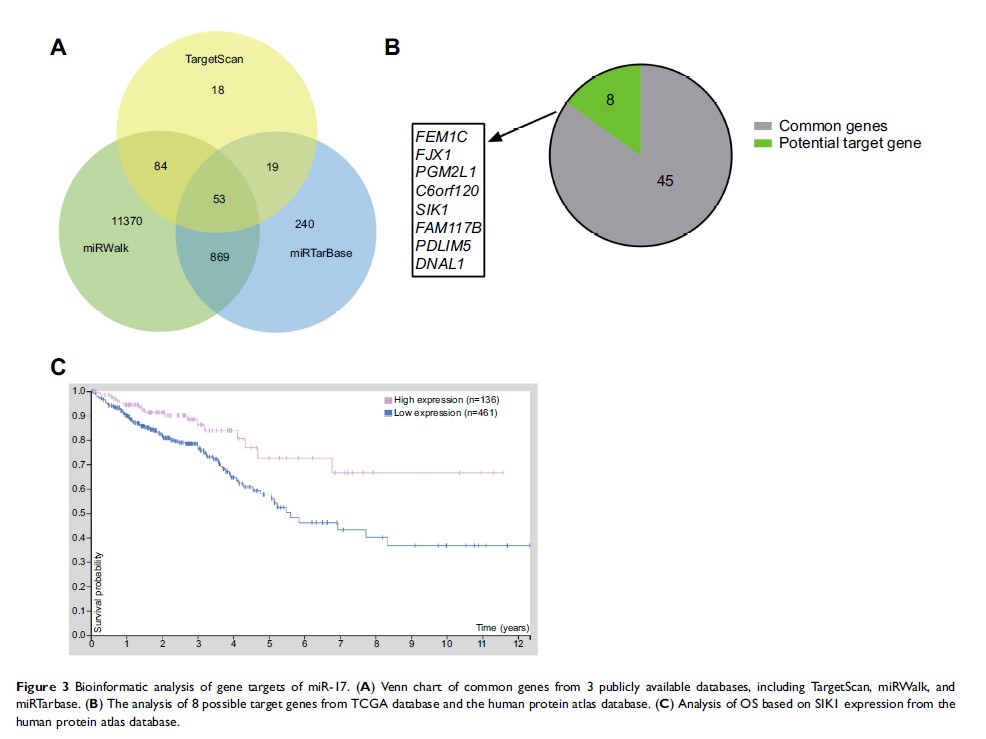9 0 8 1 0
论文已发表
注册即可获取德孚的最新动态
IF 收录期刊
- 2.6 Breast Cancer (Dove Med Press)
- 3.9 Clin Epidemiol
- 3.3 Cancer Manag Res
- 3.9 Infect Drug Resist
- 3.6 Clin Interv Aging
- 4.8 Drug Des Dev Ther
- 2.8 Int J Chronic Obstr
- 8.0 Int J Nanomed
- 2.3 Int J Women's Health
- 3.2 Neuropsych Dis Treat
- 4.0 OncoTargets Ther
- 2.2 Patient Prefer Adher
- 2.8 Ther Clin Risk Manag
- 2.7 J Pain Res
- 3.3 Diabet Metab Synd Ob
- 4.3 Psychol Res Behav Ma
- 3.4 Nat Sci Sleep
- 1.9 Pharmgenomics Pers Med
- 3.5 Risk Manag Healthc Policy
- 4.5 J Inflamm Res
- 2.3 Int J Gen Med
- 4.1 J Hepatocell Carcinoma
- 3.2 J Asthma Allergy
- 2.3 Clin Cosmet Investig Dermatol
- 3.3 J Multidiscip Healthc

MicroRNA-17 通过下调 SIK1 促进人结直肠癌中的细胞增殖和迁移
Authors Huang C, Liu J, Xu L, Hu W, Wang J, Wang M, Yao X
Received 7 November 2018
Accepted for publication 5 March 2019
Published 24 April 2019 Volume 2019:11 Pages 3521—3534
DOI https://doi.org/10.2147/CMAR.S191087
Checked for plagiarism Yes
Review by Single-blind
Peer reviewers approved by Dr Amy Norman
Peer reviewer comments 3
Editor who approved publication: Dr Kenan Onel
Purpose: There is
mounting evidence to indicate that microRNA-17 (miR-17) is expressed and
functionally involved in human cancers. However, the molecular mechanism
underlying the role of miR-17 in colorectal cancer (CRC) remains largely
unclear. This study aims to reveal the biological function of miR-17 in
colorectal cancer.
Materials and methods: The
expression of miR-17 in CRC cells and tissues was examined using qRT-PCR. Cell
proliferation and migration assays were performed after transfection with an
miR-17 mimic and inhibitors. The potential gene targets of miR-17 were
predicted by bioinformatics analysis and further validated by PCR, Western blot
and dual luciferase reporter assays.
Results: The
expression of miR-17 was significantly upregulated in CRC cell lines and
tissues and may imply poor prognosis. miR-17 upregulation promoted cell
invasion and migration in CRC cell lines in vitro, while downregulation of
miR-17 inhibited tumor progression. SIK1 was identified as a potential direct target
of miR-17 by dual luciferase reporter assay, and its downregulation in CRC may
suggest poor prognosis.
Conclusions: Our study
indicated that upregulated miR-17 may promote the progression of CRC and may
exert its function as a tumor suppressor miRNA by targeting SIK1 .
Keywords: SIK1,
colorectal cancer, prognosis, tumor biomarker
